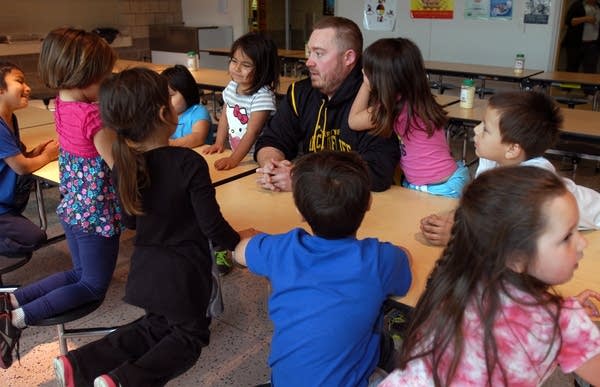Five tips for kindergartners’ FIRST first day of school

Go Deeper.
Create an account or log in to save stories.
Like this?
Thanks for liking this story! We have added it to a list of your favorite stories.
For many of Minnesota's youngest learners, the first first day of school can be both an exciting and intimidating time.
University of Minnesota senior lecturer Annie Hansen-Burke said kindergartners might have a few rough weeks at the end of August or the beginning of September. They might be unusually quiet or moody.
"Parents just might notice a behavior change. So, if your child is quieter than usual or maybe pushing back a little bit more than usual, that might mean that they're dealing with something internal," Hansen-Burke said.
Here are five tips to help both kids and parents through the first day of kindergarten:
Turn Up Your Support
MPR News helps you turn down the noise and build shared understanding. Turn up your support for this public resource and keep trusted journalism accessible to all.
1) Ask kids how they feel
Hansen-Burke said kindergartners have a wide range of emotions in reaction to a big life change.
“For a lot of kids I think there’s maybe going to be a mix of excitement and nervousness. Lots of kids get excited about having a backpack,” Hansen-Burke said.
“You may have some feelings of worriedness, you may have some resistance to even going. Declarations that they’re not going to get out of bed … there’s definitely a range.”
2) Normalize the worry
Parents might want to just start by asking kids how they feel. Hansen-Burke said it can be helpful to just legitimize whatever a kindergartner might be feeling.
“Just normalizing, like 'Yeah, going to kindergarten for the first time can be really scary. It's scary for a lot of kids. But you know what? It's going to be great, and we're going to get through it together.’ That, I think, can be really helpful."
3) Walk them through what to expect
If kids are able to visualize what kindergarten will be like, it might help ease some of their anxiety. Hansen-Burke recommends taking them to their new school, introducing them to their teacher. She said it can help to walk them through their daily schedule — tell them when they’re going to leave, when they’ll come home and what they might do when they’re at school.
4) Establish a routine
Getting kids into a routine will be helpful with a transition to school.
“Make sure that you’re emphasizing a lot of things are going to stay the same. I’m still going to be here. We’re going to have dinner together at night, we’re going to see each other at this time. And I can’t wait to talk about all the things that you did that day,” Hansen-Burke said.
5) Give yourself extra time and space
Kindergarten can be a big transition for both kids and parents. Hansen-Burke said it can be helpful to clear your schedule for the first week of school as much as possible.
“All transitions kind of shake things up a little bit,” Hansen-Burke said. “If you can be a little bit extra there for your kids that week, just spending a little bit of quality time together … that can be helpful.”


